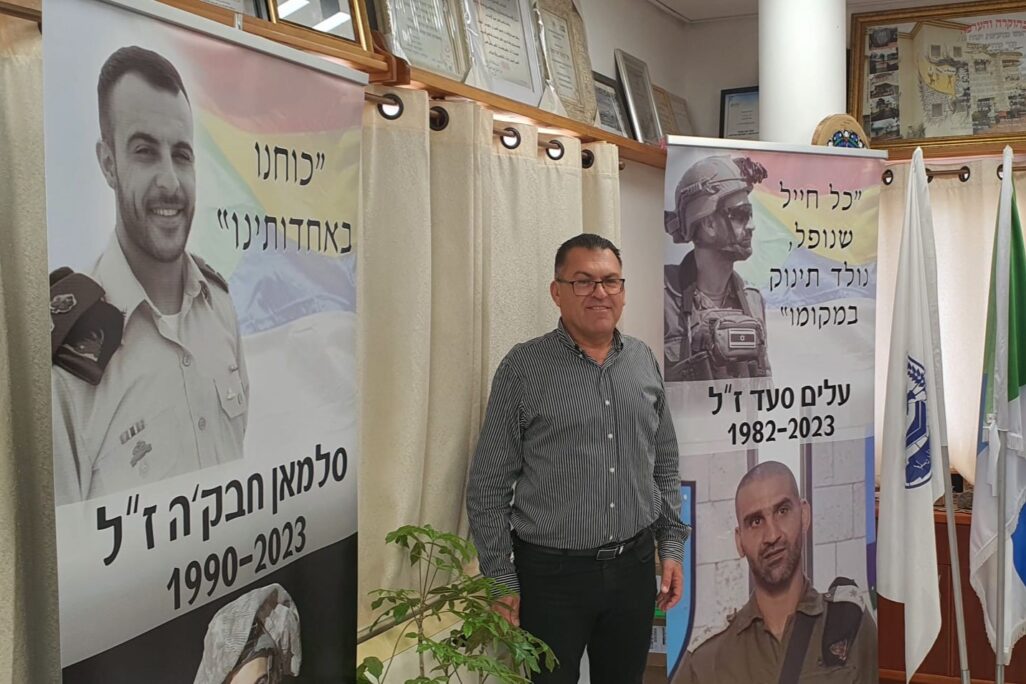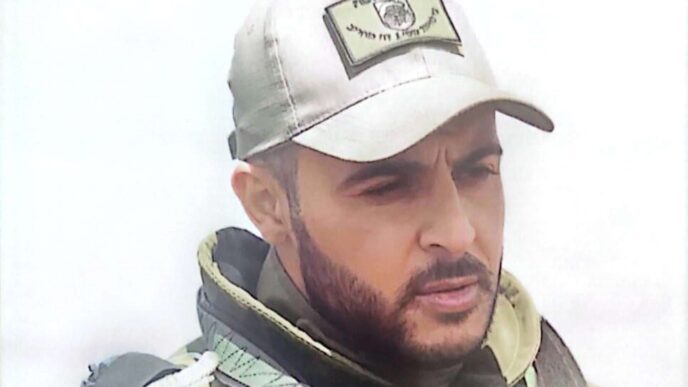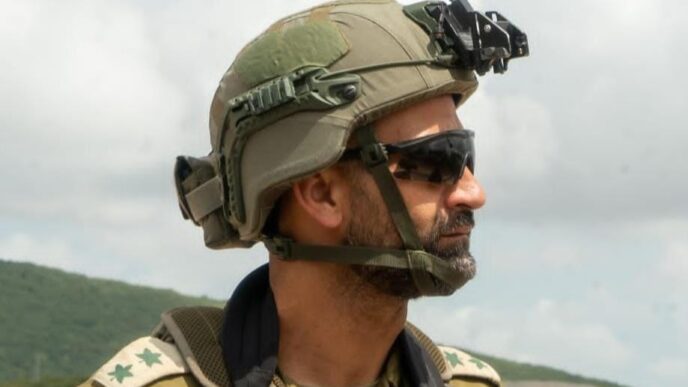
Lieutenant Colonel Alim Abdallah, from the Druze village of Yanuh in the north of Israel, was supposed to begin studying for his master’s degree at the University of Haifa when he was called upon to assist in the fighting in the north during the outbreak of war. On October 9th, Abdallah, the deputy commander of Brigade 300 in the 91st Division, was killed in a battle with militants along Israel’s border with Lebanon.
Lieutenant Colonel Salman Habaka, also from Yanuh, was killed in action two months later in a battle in the Gaza Strip. He was a commander in the Armored Corps. “On Yom HaZikaron everything comes back to us,” said his father, Imad Habaka.

The small village, with approximately 4,900 residents, is part of the Yanuh-Jatt Regional Council in the Western Galilee, and has been in deep mourning over the last several months. “These are two tragedies. The people are still grieving, and it hasn't ended,” Habaka said.
“He Threw Three Grenades and Killed Three Terrorists”
Mudi Sa’ad, the head of the local council and the cousin of Lt. Col. Abdallah, spoke about a modest man, a family man who was well-respected in society. “He has a large family. There are 13 people – 10 sisters and three brothers. He married Muna and they have two daughters and a son.
“Despite being a combat officer, he was connected to his home. He tried as much as he could to help out and be with his family at every opportunity. He was the second child in his family. His brother was in the Prison Service, another brother works in the Ministry of the Interior, and a third brother is a Major who served with him in the same unit.”
According to Sa’ad, Abdallah’s brother, who served as a company commander in the same brigade, heard the report of Abdallah’s injury over military radio. “He was preparing his company for battle under live fire when he heard a report of a terrorist incursion. He understood that his brother had run in that direction. He received a report that the deputy brigade commander, his brother, was injured.”

After receiving the report of a terrorist incursion, the brigade commander arrived on the scene. The terrorists, who had situated themselves on high ground, opened fire towards the brigade commander, killing Sergeant first class Jawad Amer and Master sergeant (res.) Gilad Molcho. “Alim arrived on the scene and threw three grenades, killing three terrorists,” said Sa’ad. “The fourth terrorist hid and fired towards him. Alim was hit by a bullet between the sides of his flak jacket when he turned to ask for ammunition.”
Abdallah was 41 at the time of his death. “On the day he died, they were supposed to throw him a goodbye party,” Sa’ad continued. “That Wednesday he was planning to go on a short vacation and then start studying for his master’s degree at the University of Haifa.
“Alim was a fighter who was always at the front. That’s his legacy. He could’ve stayed at the base, he had already finished his job. But Alim was committed and didn’t remain indifferent. He jumped into action, like he was used to doing.
“It’s very hard for his widow, and for his children, but a disaster starts out big and over time you gain perspective. But his death is painful. Every day I see one of his sisters making a post about Alim.”
“Warfare on the Streets of the Kibbutz”
Lt. Col. Salman Habaka, 33 at the time of his death, served as a battalion commander in the Armored Corps. “He’s my first son,” said his father, Imad. “He was a magnificent child, he wanted to know, to learn, to do. From his childhood it was clear that he would be special. He was easygoing and respected all people. Everyone loved him.”
Habaka is survived by three brothers and two sisters. “His brother developed multiple sclerosis at age ten, now he’s in a wheelchair,” Imad Habaka said. “Salman loved him. That’s where his affinity towards people with special needs came from. He would invite them into the battalion and give them a chance to try it out. They talked about how Salman made them happy for a day.”
In eighth grade, Salman Habaka transferred to the Naval Officers’ School in Akko. “He stood out there too, despite the language gap. They always listened to him. Everyone ran to be with him, to work with him,” his father said. “His smile attracted people to him, the love that he brought. He knew how to connect with people, everyone was a friend of his.”
Before enlisting, Habaka attended the Kerem-El pre-military academy in Daliyat al-Karmel. He enlisted in 2009 and served in the Armored Corps. “He saw the power of a tank,” his father said.
Habaka married his wife Arin, and the couple had a son two years ago.
On October 7, he rushed from his home in Yanuh to the Tze’elim Army Base in Israel’s south, close to the heart of the Hamas invasion. On the way he called up members of his battalion. “I raced from the Galil to Tze’elim to get in a tank and get to the attacked communities as fast as possible in order to save anyone who was alive” Salman Habaka said afterwards. He arrived at Kibbutz Be’eri, among the most devastated communities, with two tanks and joined the members of the Paratroopers Brigade fighting there.
“I made it inside of Be’eri and I saw Brigadier General Barak Hiram, and the first order he gave me was to fire a shell into a house,” Habaka recalled. “The first question that arises – could there be hostages there? We took all of the preliminary steps before we decided to fire a shell into the house, but as soon as we fired we were able to go from house to house and free the hostages, and that’s how the fighting went into the evening. Inside of the kibbutz, on the streets.”
Habaka went on fighting and was later killed in a battle in the northern Gaza Strip. He was injured when he stuck his head out of the tank’s turret in order to reassess the situation before an attack.
“Today, half a year later, we’re still in mourning,” Habaka’s father Imad said. “It doesn’t end. He was something special and unique to his family, to his friends, and also to his country. On Yom HaZikaron everything comes back to us.
“I try to be strong for everyone, and for myself. I took on the task of memorializing Salman. I meet with 12th graders before their enlistment and I tell them who he was, what he did in Gaza. I speak at pre-military academies. I stay strong by telling Salman’s story and spreading his legacy.”
Imad Habaka organized a bike trip for people with special needs in memory of Salman. “We established classrooms. We’re planning on planting a flower garden, ‘the Unity Garden.’ People with special needs can practice working with flowers there.”
Yanuh-Jatt: 89% Enlistment Rate
“Two sons of Yanuh-Jatt have fallen – Alim Abdallah and Salman Habaka,” Sa’ad said. “We’ve been through complicated days full of emotion, full of pain and sadness. Tens of thousands of visitors have come to console us. It’s very hard. The entire community was in mourning. Everyone is sad. In the village we’re trying to memorialize them both, we’re doing all sorts of things.”
According to Sa’ad, the stories of Abdallah and Habaka are already having an effect on local youth. “My nephew enlisted three weeks ago,” he said. “The enlistment rate here is 89%, most of them doing meaningful service. We are Israelis, this is our country. The feeling is that we are facing a test, and that we will stand strong with the nation, protect the country and the communities here. There’s no anger at the State of Israel. We overcome everything. First of all, we fight. After that, if need be, we’ll wage our own battles.
“October 7 was a rude awakening for many of the Jews. Whenever a soldier falls, everyone hugs. This time the hug is more meaningful. It’s a different hug. After October 7, the hug was real, more honest, we felt a shared pain. I felt that as a resident of Yanuh and as an Israeli.”
That hug does not erase the difficulties and challenges facing Yanuh and other Druze communities.
“I hope the country will regain its composure and look at its problems differently,” Sa’ad said. “We’ve heard sirens go off from time to time. There’s no bomb shelter in the center of the village where most of the residents live. Eight months ago 15 new mobile shelters were approved, and we set up eight shelters that we received from the Homefront Command.”
According to Sa’ad, the village’s economy has improved lately, but is in danger of regression due to the cancellation of discounts and tax incentives for the community. “We’ve been hit hard in Yanuh. We had more than 400 people serve in reserve duty during the war. Forty combat soldiers are on standby duty. As things improve, the whole community will feel better. It’ll make things better for everyone.”






